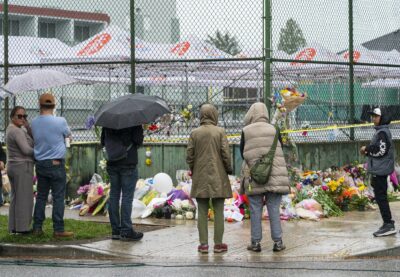Advocate fears mental-health stigma after Vancouver festival tragedy
By Canadian Press on May 1, 2025.

VANCOUVER — A British Columbia advocate says people with mental illness and those who work with them are afraid of the consequences that could come in reaction to the festival tragedy that killed 11 people in Vancouver last Saturday.
Health officials have said the suspect, Adam Kai-Ji Lo, was under the care of a mental health team, and Vancouver Mayor Ken Sim said Lo was on “extended leave,” a term used to refer to people under involuntary care, at the time of the attack.
Jonny Morris, the CEO of the Canadian Mental Health Association’s B.C. division, said there is “real fear” there could be reactionary moves that may not make the kind of difference people are seeking in response to the attack at Vancouver’s Lapu Lapu Day festival.
But these could add to stigma around mental health, he said.
“I’m picking up fears that … because of the way it’s being framed, without the analysis of the system beyond the individual, will stigma increase?” he said.
“We’ve seen that after incidents like this. Will discrimination increase? Will employers say, ‘Oh, you have a mental illness. Oh, you might be violent. I’m not going to hire you.’ And what about landlords and people with mental illness? ‘Oh, we don’t want you living in our building because of your mental illness.’
“Because that’s how stigma works. That’s how discrimination works.”
Police have said Lo had “a significant history of interactions with police and health-care professionals related to mental health.” He is facing eight second-degree murder charges.
Premier David Eby has promised a review of B.C.’s Mental Health Act and said there will be “full public inquiry” if the criminal case does not lead to answers.
Sim said Wednesday that the case pointed to a “deeper failure in the mental-health system” and that people are “sick and tired” of inquiries into a recurring pattern of people in a mental-health crisis becoming involved in violence.
Morris said any examination of the situation should be a systemic review of all factors that contributed and how the system can be improved.
He said the way the tragedy is discussed publicly shapes how safe people feel about accessing help if they are in a mental-health crisis.
“Stigma, and the ways we talk about mental illness in these moments really can contribute to feeling safe and people feeling more likely to reach out for help, or it can push people apart and help people feel less safe reaching out for help,” he said.
He said it’s important to let the legal process unfold to fully understand what role mental illness and the impacts of symptoms played in the situation.
“The ways in which we describe mental illness, people with mental illness, has very real impact upon the millions of people across this country who live with mental illness and who will not go on to commit a violent crime, and we just need to think that through carefully before reaching for solutions.”
Vancouver Police Sgt. Steve Addison said Thursday that most people who live with mental illness “don’t ever come into contact with the police.”
“That’s really important to understand because there are conversations happening right now about mental health, and those conversations include things like institutionalization and forced care,” he told a news conference.
Addison also provided an update on the status of surviving victims in the attack, saying 13 people continue to be treated in hospital, with four in critical condition and two in “serious” condition.
“That means that one person’s medical status has improved slightly,” he said.
On Wednesday, Eby said people should “reserve judgment” on what went wrong in this case, after being asked about the suspect’s mental health-care situation.
“The vast majority of people who live with mental-health issues are no threat to anybody in the public,” Eby said.
More victims in the attack have been identified, including Jenifer Darbellay, 50, a mother of two children, ages seven and 15. Her husband, Noel Johansen, said she was creative and empathetic.
Johansen said he was looking for dessert when the SUV crashed into the crowd like a “tidal wave.”
The group Latincouver, a community support group that helps Latin Americans make a home in the province, said it lost community members in the attack.
Daniel Samper, Glitza Maria Caicedo and their daughter Glitza Daniela Samper along with Kira Salim were all killed.
Paola Murillo, the group’s executive director, said Salim was an artist and volunteer for the group.
She said Glitza Maria Caicedo also volunteered for a few years and always attended their events.
Murillo said the deaths have shaken their community to the core.
The brother of Richard Le confirmed this week that Le, his wife Linh Hoang and their five-year-old daughter Katie Le were also killed.
— With files from The Associated Press and Brenna Owen
This report by The Canadian Press was first published May 1, 2025.
Ashley Joannou, The Canadian Press
35-34


